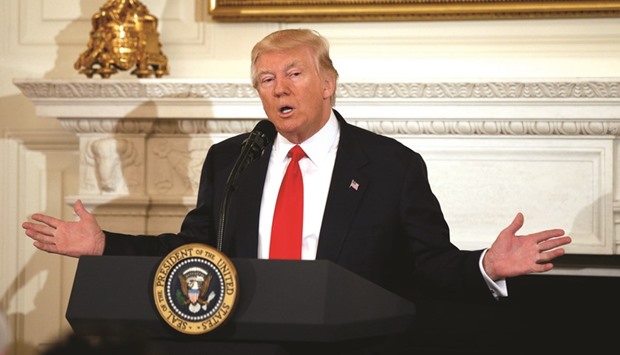During a first turbulent month in office, Trump has put homeland security front and center -- plotting immigration bans, border walls and a nearly 10 percent increase in defense spending.
But aides say his prime time address to lawmakers and the nation at 9:00 pm (0200 GMT Wednesday) will tilt the focus back toward the type of bread and butter issues that helped win him the presidency.
‘All I can do is speak from the heart and say what I want to do,’ Trump told the conservative morning show Fox & Friends, according to excerpts of an interview to air ahead of his Tuesday address.
Trump's focus will be ‘solving real problems for real people’ said a senior administration official, previewing an address centered on ‘economic opportunity.’
The billionaire's tough talk and populist economic message were crucial in his November victory over Hillary Clinton, winning over voters in crucial rustbelt states like Michigan, Ohio and Pennsylvania.
But his White House honeymoon has been anything but. Infighting and inexperience have dogged the new adminstration.
Some 44 percent of Americans think Trump is doing a good job, according to the RealClearPolitics poll average.
That is a historic low for modern presidents after a month in office.
President Barack Obama's rating on the eve of his first speech to a joint session of Congress in February 2009 was 62 percent.
Trump is likely to use the pomp and tradition-filled occasion -- which is a State of the Union Address in all but name -- to tout his willingness to tear up trade deals that he claims are bad for the American worker.
The CEO-turned-commander-in-chief has already withdrawn the United States from a trans-Pacific trade pact and is threatening to scrap a deal with Canada and Mexico if substantial changes are not made.
He is likely to claim once again credit for the rising stock market and corporate job announcements.
But many will be looking beyond the rhetoric to what plans Trump has in store for high-stakes tax and healthcare reform.
On both issues Trump faces a difficult balancing act with fellow Republicans, who control both the Senate and the House of Representatives.
Lawmakers are sure to offer him a warm reception but could yet frustrate his goal of swift, far-reaching reforms.
‘We have a really terrific, I believe, healthcare plan coming out,’ Trump assured Fox & Friends.
But while reforming ‘Obamacare’ was a rallying cry on the campaign trail, fissures are emerging within his party.
Conservatives are desperate to pull the law out by its roots, but party pragmatists are wary of dismantling a system that has, despite driving up costs for many, helped some 20 million Americans obtain health insurance.
The move is appearing increasingly controversial in light of town hall meetings this past week in which constituents expressed worry and anger to their Republican lawmakers about the prospect of losing health coverage.
‘Nobody knew health care could be this complicated,’ the president said Monday at a meeting with the nation's governors at the White House.
Similarly, efforts to cut corporate taxes might only be paid for with a contentious import tariff that might not pass muster in the Senate.
- 'More with less' -
Tensions between the executive branch and the Republican-led Congress are also simmering over Trump's 2018 budget proposal, which will undergo intense negotiations in coming months as it goes from wish list to law.
The White House said Monday Trump wants to hike defense spending by $54 billion, or about nine percent above current levels, with corresponding cuts in foreign assistance and other non-military spending.
Nonetheless, Trump will struggle to sustain promised -- but costly -- social security spending without worsening the country's national debt, which is set to top $20 trillion on his watch.
Democrats have been quick to accuse to Trump of favoring the rich and powerful, despite his populist campaign message.
In a ‘prebuttal’ of Trump's speech, House minority leader Nancy Pelosi and top Senate Democrat Chuck Schumer, warned of tough times ahead for American workers.
‘In future months, burden after burden will be shifted off the special interests and onto the working people,’ Schumer said.
Republicans hold 52 Senate seats, compared to 48 by the Democrats, who are pledging a united front that could slow down or even block some reform legislation in the event some Republicans defect.

